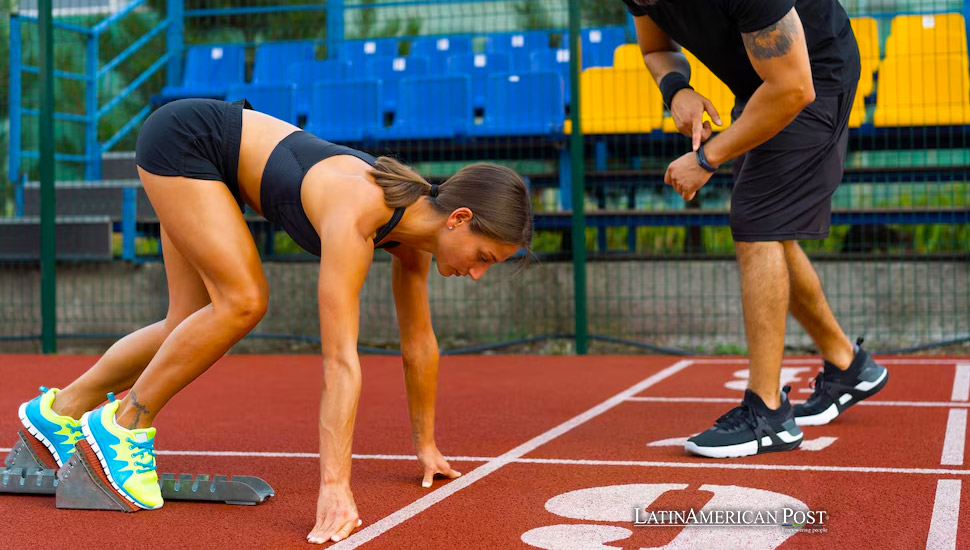Balancing Sports and Life Decisions Impact Latin America and the Caribbean Athletes’ Mental Health

athletes in Latin America and the Caribbean face unique challenges in balancing their sports careers with education and work. This study explores how these career decisions impact their mental health, revealing critical insights into maintaining a healthy balance between life spheres.
Athletes in Latin America and the Caribbean face significant career decisions that influence their overall life balance and mental health, according to the study Career Trajectories of Junior Athletes in Latin America and the Caribbean and their Relationship with Mental Health published in the International Journal of Sport and Exercise Psychology. This study explores how junior athletes in this region navigate their career paths and the subsequent effects on their mental well-being.
During their career development, athletes must make crucial choices regarding prioritizing their sports careers over other life spheres. These decisions often involve continuing or dropping out of school, migrating or staying in their place of origin, searching for a job or not, and deciding whether to remain in or retire from their sports career. The chosen pathway shapes athletes’ career trajectories, determines the competencies needed to balance different life spheres, and impacts their mental health. While the environment in which athletes’ careers are embedded—such as sports systems, country regulations, and funding opportunities—can influence the selected trajectories, previous research has predominantly focused on European and North American contexts, leaving Latin American and Caribbean contexts relatively underexplored. This study investigates explicitly the career trajectories developed in Latin America and the Caribbean and explores their association with athletes’ mental health.
Career Pathways and Challenges
Athletes can develop various sports career trajectories, including focusing exclusively on sports (linear trajectory), prioritizing sports while keeping studies or work in the background (convergent trajectory), giving equal importance to sports and studies or work (parallel trajectory), or abandoning either sports or the other sphere when under excessive pressure (divergent trajectory). Among these options, a dual career (DC) is a concurrent or parallel trajectory in which athletes combine sports with studies or work. Developing a DC has been shown to support a more adaptive identity, achieving a balance between studies/work and training, fostering the development of personal competencies, and facilitating retirement from sports. However, pursuing a DC also comes with increased demands related to balancing multiple life spheres, which can affect athletes’ mental health if not properly managed.
Mental health is understood as a state of mental well-being that enables people to cope with the stresses of life, realize their abilities, learn well and work well, and contribute to their community. It is not merely the absence of mental illness. This conception distinguishes between positive mental health (the presence or absence of well-being and social functioning) and ill mental health (the presence or absence of symptoms indicative of mental illness). Mental health is both a resource and a desirable outcome of developing a sports career. Recent studies have highlighted the diversity of factors that influence the mental health of athletes pursuing a DC and the need to explore the differences in mental health between athletes developing different trajectories.
Latin American and Caribbean Context
Unlike the well-documented experiences of athletes in North America and Europe, the career trajectories and mental health of athletes in Latin America and the Caribbean have received limited attention in the literature. These regions, comprising countries from South America, Central America, and the Caribbean, share geographical proximity and a common historical, cultural, and socio-political background that collectively shapes their identity. Sports play a significant role in this identity, and athletes often face unique challenges such as a lack of technical and financial support and a tendency to migrate for better opportunities.
Experts have warned of the systematic lack of research attention that Latin America and the Caribbean have received. The available scientific literature on DC in this context is unequal between countries, with the most prevalent research coming from Argentina, Brazil, Chile, Colombia, and Peru. This data, mainly qualitative, revealed a tendency to prioritize sports careers over other life spheres, showed low efforts to promote DC, and identified a need for sport-specific regulations and cooperation between stakeholders in Latin American countries. The scarcity of research in these regions underscores the urgent need for more studies to understand and address the unique challenges faced by junior athletes.
A recent review found that only 13.2% of the included studies were conducted outside North America and Europe, and no studies were identified in the context of Latin America and the Caribbean. To our knowledge, no studies have previously explored the development of career trajectories in Latin America and the Caribbean and their relationship with mental health. Therefore, this study, the first of its kind, aimed to fill this gap and provide valuable insights into the career trajectories of Latin American and Caribbean junior athletes and their relationship with mental health.
The study involved 236 junior Latin American athletes (44.5% female) aged 14 to 23. All participants actively pursued an athletic career and competed in the Cali-Valle Junior Pan American Games in 2021, representing 28 countries from Latin America and the Caribbean. The sports with the highest participation rates were athletics, handball, wrestling, and taekwondo. Most participants had at least ten years of sporting experience.
The study measured demographic information, career type, career trajectories, and mental health. An ad hoc questionnaire was developed to assess the degree of prioritization that participants assigned to their sport, education, and work domains. Mental health was assessed using the 12-item Spanish version of the General Health Questionnaire-12 (GHQ-12), which measures social functioning, depression and anxiety, and loss of confidence and self-esteem.
Results and Discussion
The cluster analysis identified four distinct profiles based on varying combinations of prioritized life spheres. The first group, Triple Career Priority, included athletes who considered all three domains as priorities in their lives. The second group, Sport Priority, included athletes who prioritized only the sports sphere. The third group, Dual career priority, included athletes who prioritized sports and academics. The final group, No Clear Priority, included athletes who needed to identify a priority among the areas included in the study. 56.9% of the sample prioritized one or more alternative life spheres outside sports.
Comparisons of mental health levels across the identified clusters suggested that athletes prioritizing a DC trajectory showed better mental health levels than those with a triple career priority. The results indicate a trend showing that DC athletes exhibit better mental health levels than those focused solely on sports or those with multiple life spheres demanding their attention. These findings align with previous studies suggesting that pursuing an academic career helps student-athletes alleviate the pressures inherent in sports and provides a means of distancing themselves from it during stressful periods.
The findings also highlight the importance of maintaining an optimal balance among life spheres to develop sustainable and safe athletic careers. The study recommends designing and implementing sport-specific policies to create DC development environments that foster this career pathway. Additionally, it emphasizes the need for Career Assistance Programs (CAPs) to support athletes in developing their athletic careers and making informed decisions during critical transitions.
Also read: Valdano Advocates for South American Soccer’s Uniqueness
This study provides valuable insights into the career trajectories of junior athletes in Latin America and the Caribbean and their association with mental health. By offering the first empirical study on this topic in the region, the results reveal the importance of maintaining an optimal balance among life spheres to develop sustainable and safe careers. Sports psychologists and policymakers should consider these findings to identify risk groups and develop country-specific programs to promote DCs and assist junior athletes in deciding their career trajectories.





